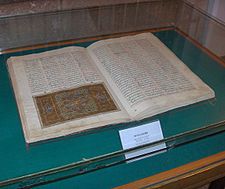User:BryanLopez0/Diwan-e Shams-e Tabrizi

| Part of a series on Islam Sufism |
|---|
 |
|
|
Dīvān-e Kabīr or Dīvān-e Šams-e Tabrīzī (The Works of Šams Tabrīzī) (Persian: دیوان شمس تبریزی) or Dīvān-e Šams is one of Mawlānā Jalāl-ad-Dīn Muhammad Balkhī's (Rumi) masterpieces. A collection of lyric poems that contains more than 40,000 verses, it is written in the New Persian language and is considered one of the greatest works of Persian literature.
Dīvān-e Kabīr ("the great divan") contains poems in several different styles of Eastern-Islamic poetry (e.g. odes, eulogies, quatrains, etc.). It contains 44,282 lines (according to Foruzanfar's edition,[1] which is based on the oldest manuscripts available): 3,229 odes, or ghazals (total lines = 34,662); 44 tarji-bands (total lines = 1698); and 1,983 quatrains (total lines = 7932).[2] Although most of the poems are in New Persian, there are also some in Arabic, and a small number of mixed Persian/Greek and Persian/Turkish poems. Dīvān-e Šams-e Tabrīzī is named in honour of Rumi's spiritual teacher and friend Shams Tabrizi.
Greco-Persian and Greek poems
[edit]The following poem of Rumi is written in Persian while the last words of each verse end with a Greek word:[3]
- νηστικός / نیم شب از عشق تا دانی چه میگوید خروس: خیز شب را زنده دار و روز روشن نستکوس
- ἄνεμος/ پرها بر هم زند یعنی دریغا خواجهام : روزگار نازنین را میدهد بر آنموس
- ἄνθρωπος/ در خروش است آن خروس و تو همی در خواب خوش : نام او را طیر خوانی نام خود را آنثروپوس
- ἄγγελος/ آن خروسی که تو را دعوت کند سوی خدا: او به صورت مرغ باشد در حقیقات انگلوس
- βασιλιάς/ من غلام آن خروس ام که او چنین پندی دهد : خاک پای او بِ آید از سر واسیلیوس
- καλόγερος/ گَردِ کفشِ خاکِ پای مصطفی را سرمه ساز : تا نباشی روز حشر از جملهی کالویروس
- Σαρακηνός/ رو شریعت را گزین و امر حق را پاس دار : گر عرب باشی و اگر ترک و اگر سراکنوس
The following are Greek verses in the poetry of Mawlana Jalal ad-Din Rumi (1207-1273), and his son, Sultan Walad (1226-1312). The works have been difficult to edit, because of the absence of vowel pointing in most of the verses, and the confusion of scribes unfamiliar with Greek; different editions of the verses vary greatly:[4]
| Verse | Greek Phrases (written in the Persian script by Rumi) | Greek
equivalent |
Persian Translation | English Translation |
|---|---|---|---|---|
| 1a | افندیس مَس ان، کی آگاپومن تُن/دُن | Αφέντης μας έν κι αγαπούμεν τον | او سرور ما است و ما او را دوست داریم) عاشق او ایم) | He is our Master and we love him |
| 1b | کی اپ اکِینون اِن کالی زوی مَس | κι απ’ εκείνον έν καλή η ζωή μας | به خاطر او است که زندگی ما خوش است | It is because of him that life is sweet |
| 2a | ییَتی ییریسِس، ییَتی ورومیسِس | γιατί γύρισες γιατί βρώμισες | چرا برگشتی؟ چرا بیمار ای؟ | Why did you turn around because you were ill? |
| 2b | په مه تی اپاتِس، په مه تی اخاسِس | πε με τι έπαθες, πε με τι έχασες! | به من بگو ترا چه افتاد؟ به من بگو چه گم کردهای؟ | Tell me what happened to you? Tell me what did you loose? |
| 11a | ایلا کالی مو! ایلا شاهی مو! | Έλα καλέ μου, έλα σάχη μου· | بیا زیبای من. بیا شاه من | Come my beautiful, come my king. |
| 11b | ایلا کالی مو! ایلا شاهی مو! | χαρά δε δίδεις, δος μας άνεμο! | [اگر] شادی نمیدهی، به ما رایحهای بده. | If you do not give us joy, give us "wind"/"breath"! |
| 12a | پو دیپسا پینِی، پو پونِی لَلِی | Που διψά πίνει, που πονεί λαλεί· | آن که تشنه است مینوشد، آن که خسته [=زخمی] است میگرید | The thirsty one drinks while the wounded one flees |
| 12b | میدِن چاکوسِس، کاله، تو ییالی | μηδέν τσάκωσες, καλέ, το γυαλί | ای زیبا، آیا تو جام را شکستهای؟ | Tell me beautiful, did you break the cup? |

References
[edit]- ^ Furuzanfar, Badi-uz-zaman. Kulliyat-e Shams, 8 vols., Tehran: Amir Kabir Press, 1957–66. Critical edition of the collected odes, quatrains and other poems of Rumi with glossary and notes.
- ^ "About the Divan". dar-al-masnavi.org. Retrieved 24 December 2016.
- ^ "واژههای یونانی در غزلهای مولانا". پارسیانجمن (in Persian). ۱۳۹۷-۱-۱۹ ۲۱:۱۷:۳۰ +۰۰:۰۰. Retrieved 2018-11-12.
{{cite news}}: Check date values in:|date=(help) - ^ "Untitled Document". www.opoudjis.net. Retrieved 2018-11-12.
